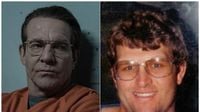The blend of reality and fiction in the Paramount+ series "Happy Face" offers a gripping look into the life of a serial killer through the eyes of his daughter, Melissa Moore. Starring Dennis Quaid as Keith Jesperson, the infamous Happy Face Killer, and Annaleigh Ashford as Melissa Reed (a fictionalized version of Moore), the show seeks to underscore the emotional toll of Jesperson’s heinous acts on his family.
Premiering on March 21, 2025, with two episodes available for streaming, "Happy Face" tells the harrowing tale of Jesperson, who is serving multiple life sentences for killing eight women between 1990 and 1995. Though many facts of the story align with real-life events, significant portions have been fictionalized to heighten dramatic impact.
According to Quaid, the portrayal involves intricate psychological facets. "Melissa had to reconcile the loving relationship she had with her father as a child with the monster her father was in reality. That's where our story comes from," he stated in promotion for the series. The show asserts Melissa dealt with the duality of her father's persona, illustrating the chaotic emotional landscape many families of offenders navigate.
Crafted from Moore's 2009 autobiography, "Shattered Silence," and her true-crime podcast began in 2018, "Happy Face" attempts to balance factual elements with narrative flair. However, some sequences, such as the portrayal of a fictional show, "The Dr. Greg Show," differ strikingly from Moore’s real experiences. On "Dr. Phil" in 2008, she initially shared her haunting tale, but the series amplifies fiction for effect.
One poignant moment mirrors a genuine childhood memory shared by Melissa. As a teenager, she sensed there was something amiss during one visit to her father. "I had no idea that I was in a crime scene," she recalled. A traumatic memory arose when she spotted a red substance on her father’s ceiling fan, which he dismissed as spaghetti sauce but later believed could have been blood, further portraying Jesperson’s duplicity.
Efforts of the show to research the psychological impact of Jesperson's actions were evident so far. The series presented intense prison visitations between stringently nurtured depictions. Melissa states, she was only able to visit her father, who has been incarcerated for decades, twice. During their last encounter in 2005, he absurdly attempted to distract her by offering mundane conversation topics instead of engaging with her discomfort over his gruesome past.
"Do you want to know why?" Jesperson asked, but Melissa was not prepared to hear the reasoning behind the killings committed by the man who had previously held her familial love. These dramatic encounters are scripted for tension but lack the raw and real interaction that profoundly affected Moore.
Additionally, the show's introduction of Melissa’s daughter leads to another fictionalization, where Hazle Reed, portrayed by Khiyla Aynne, appears intrigued by her grandfather’s notoriety. Contrarily, the actual Aspen Moore, Melissa's daughter, learned about Jesperson’s identity at the age of ten and expressed disinterest in any familial connection. She reportedly declared, "I think that he has excuses for his actions... I don't feel that his actions can be just brushed off." This reality shapes the familial context the show touches upon, contrasting with the enacted dramatization.
Notably, Jesperson's real-life notoriety came from taunting letters sent to the media in which he claimed responsibility for his crimes, signing with a smiley face. This aspect of his character is aptly referenced in the series; Quaid embodies this unsettling charm, showcasing how Jesperson believed himself the master of manipulation. "He'd even leave messages on bathroom walls with the happy face. That was kind of his I.D.," Quaid commented while preparing for the role.
Despite the dramatizations, serious elements are woven into "Happy Face." The production urges viewers to remember the victims through the lens of pain experienced by families of offenders, as many are left navigating shattered legacies. As Moore herself highlights, the emotional ramifications linger long after the truth has surfaced.
The character of Melissa Reed showcases struggles with her father's legacy while revealing how she contextualizes her childhood within the ghastly narrative of Jesperson's crimes. The fight to reclaim one's identity and steer clear of a dark heritage renders a haunting juxtaposition.
Overall, viewers are encouraged to dissect the layers between fact and fiction laid within "Happy Face," particularly as new episodes air each week. Ultimately, the show serves as a grim reminder of how deeply the consequences of criminality echo into the lives of the innocent.






